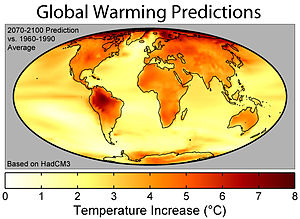 Image via Wikipedia
Image via Wikipedia
Think health costs are hot now? Factor in global warming
A report by University College London and The Lancet, a leading public health journal, recently called global warming the greatest threat to public health this century. As I described in a June 21 column, the report said climate change will produce worsening patterns of vector and waterborne disease; heat and respiratory illnesses; malnutrition; and harm from extreme weather events, flooding and sea level rise. Billions of people in both developed and developing nations will be affected.
In Oregon, for instance, asthma is already a major problem, and it will expand as temperatures increase. Heat-related illnesses will grow as we experience more frequent periods of 100-degree days. West Nile Virus, which is caused by infected mosquitoes that migrate northward as temperatures warm, has appeared here and eventually could spread as it has in other states.
The costs of health care are certain to skyrocket under these conditions. A study produced in February by my program at the University of Oregon, for example, found that global warming would generate a minimum of $764 million in additional health-related costs for Oregonians by 2020.
These costs are likely to increase to at least $1.3 billion by 2040. Other states will experience even higher costs. Employers and the self-insured will find it exceedingly difficult to pay the additional costs of climate-induced health impacts. Further, unless every American is automatically covered, those most affected by the health impacts of climate change — including the infirm, children, elderly and low-income individuals — will be left to fend for themselves. . . .
The media has done a good job of documenting the disinformation and consequent hysteria generated by opponents to health care reform. Less well-documented are the remarkably similar strategies being used to stop climate policies. A good example is a two-inch-thick document I recently received from a journalist friend, published by a right-wing group. It claimed to refute the science of today's global warming.
If it weren't so frightening, it would be laughable. Millions of dollars undoubtedly were spent on the publication. It has a glossy cover, is made to look like a report from the Intergovernmental Panel on Climate Change, and almost certainly was mailed to hundreds of reporters — and probably others — nationwide.
But rather than being filled with peer reviewed science, it is laced with anti- government and environmental rhetoric. Most of the claims it makes to refute the fact that the Earth is warming primarily due to human activity are irrelevant. It cherry picks data to make its case and omits other important data. Many of the key points are nonsensical. The credibility of the document, however, does not matter. The goal is to create doubt among the unsuspecting about the veracity of global warming and thus stifle support for climate protection policies.
There is too much at stake now to let this type of cynical behavior rule the day. . . .
Bob Doppelt is director of Resource Innovations and the Climate Leadership Initiative at the University of Oregon.
(And here's a link to another sobering piece very much worth reading.)

![Reblog this post [with Zemanta]](http://img.zemanta.com/reblog_e.png?x-id=7230e546-ad37-43f2-8890-6f72e52c2020)




No comments:
Post a Comment